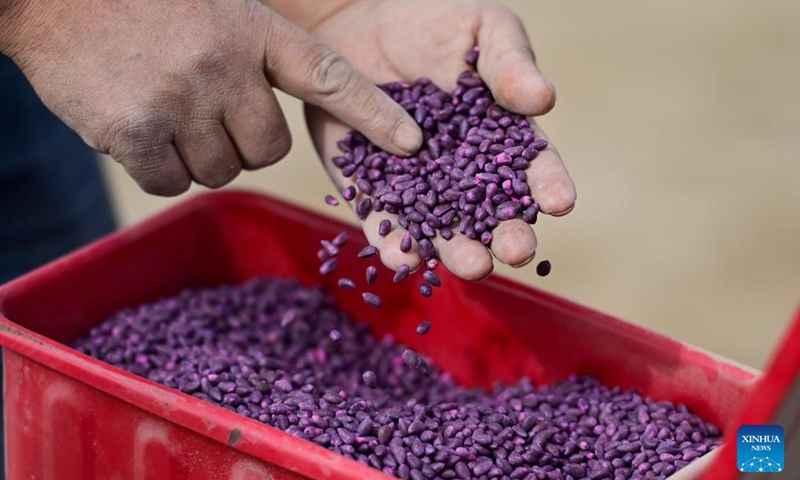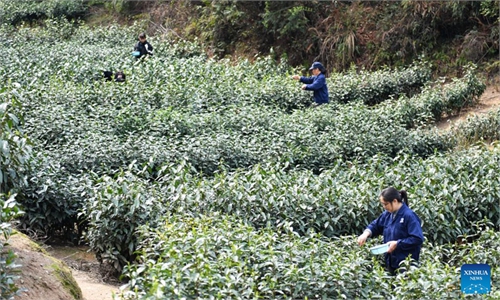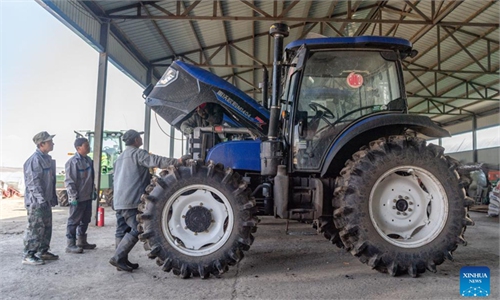
A farmer checks cotton seeds at a farmland in Awat County of Aksu, northwest China's Xinjiang Uygur Autonomous Region, March 27, 2024. Xinjiang is a major hub of cotton production. As the temperature rises, the spring sowing of cotton in Xinjiang kicked off from south to north. In recent years, advancements in agricultural technology have gradually become vital allies to the farmers of Xinjiang. From planting to harvesting, mechanization and intelligent facilities have been widely applied.(Photo: Xinhua)
China has achieved smooth progress in spring sowing, with planned sowing areas exceeding 950 million mu (63.33 million hectares) for the season in 2024. Some 7.6 percent of the country's spring grain has been sown, and more than 80 percent of early rice seedlings have been cultivated, China Media Group (CMG) reported on Saturday, citing data from the Ministry of Agriculture and Rural Affairs.
Experts and industry insiders said that the country's overall spring planting situation is stable, with a limited impact from some recent natural disasters in the southern part of China.
For instance, the spring sowing of cotton officially kicked off in some counties and cities at the end of March in southern parts of Northwest China's Xinjiang Uygur Autonomous Region, a Xinjiang farmer surnamed Xie told the Global Times.
Xie noted that mechanized sowing is being used in high-standard demonstration farmlands in the Aksu prefecture.
The busy scenes in Xinjiang are just a snapshot of China's bustling spring sowing. The growth of major crops in many regions across China is stable while localities have been implementing effective measures to achieve corresponding targets, as the grain sowing area for the spring totals more than half of the annual grain area, according to the CMG report.
The planned area for North China's Inner Mongolia Autonomous Region exceeds 110 million mu, with the planting area for key crops such as corn and rice increasing. Thanks to ramped-up efforts to promote high-quality development of farmland, along with other supportive measures, a farmer named Zhao Guang based in Baotou has been able to cultivate an additional 3,000 mu.
Zhao told CMG that local farmers have been motivated to farm with subsidies, and his farmland this year has reached more than 26,000 mu.
Spring sowing activities play a vital role for major granaries in northern China that have just a one-time sowing, Li Guoxiang, a research fellow at the Rural Development Institute of the Chinese Academy of Social Sciences, told the Global Times on Saturday, adding that the storage of major granaries in northeastern China will have a significant impact on the country's grain reserve.
Experts stressed that recent natural disasters in southern China will have a limited impact on the country's overall spring sowing.
The focus of spring sowing in southern China is rice, and its good growing conditions will provide a solid foundation for the year's grain production, Guo Tao, an agriculture professor at South China Agricultural University, told Global Times on Saturday.
Guo said that the current centralized and mechanized cultivation of rice seedlings can effectively reduce the impact of severe weather on rice, as the temperature and environment can be well controlled.
A recent wind and hail disaster in East China's Jiangxi Province affected 11 prefecture-level cities such as Nanchang and Jiujiang, with a total of 313,000 people affected. It damaged 22,700 hectares of crops, with 668.9 hectares completely destroyed, media outlets reported, citing local authorities.
The spring sowing area in southern China accounts for a relatively small portion of the country's overall planting area, so the bad weather in Jiangxi Province has little impact on the overall spring sowing situation nationwide, Li said.
Industrial-scale planting in the southern part of China also helped reduce the impact of the disaster on crops, to better control the loss of spring sowing, Li noted.
Relevant authorities have enhanced support for southern Chinese provinces to tackle disaster relief amid extreme weather during the season. In March, China's Ministry of Finance and the Ministry of Agriculture and Rural Affairs allocated 830 million yuan ($117.04 million) to support 12 provinces in disaster prevention and relief targeting agricultural production.



